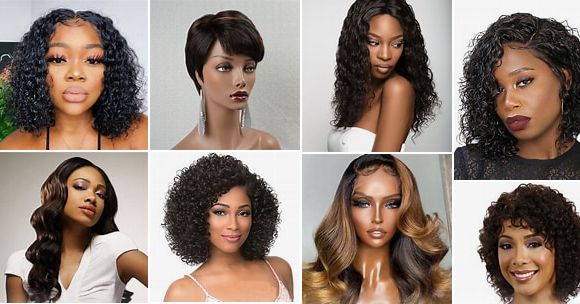Though it might sound like stereotyping, it is a well-known fact that some hairstyles suit black women best. In addition, it is also no secret that most black women wear wigs either directly or indirectly through hairstyles like weaves and sew-ins. But what is the relationship between black women and wigs? And why do black women wear wigs?
Black hair is one of the most versatile hair types in the world. It is much thicker and dense, traits that allow easy styling. But with its advantages, there are also some limitations. Black hair is drier and more brittle, making it susceptible to chemical and physical damage. But are these limitations enough reasons for black women to favour wigs over natural hair?
Why do black women wear wigs?
Why do so many African women wear wigs? There are various reasons why black women love wearing wigs. One of the most prevalent reasons is that wigs offer protection over the natural black hair, which is easily susceptible to damage and shrinkage from heat styling or harsh weather conditions.
The other reason is because of styling. Wigs are a form of self-expression, allowing for easy styling and providing a wide range of styling options.
What percentage of black women wear wigs?
The exact percentage varies and is subjective based on various things like location or region. For example, based on 2018 findings from a Quora user who asked the question on the platform, nearly 50 percent of women have worn wigs at any given time.
Furthermore, a 2017 article by The Atlanta Journal-Constitution also quoted that around 50 per cent of women have worn wigs at a given time.
Why do black women wear scarves to bed?
According to Sleep, wearing scarves to bed helps protect the hair, whether natural or artificial, from damage. The scarf reduces friction between the hair and the pillow, thus preventing breakage.
It also helps black women prioritise the health of their hair by ensuring its natural oils stay intact. The head wrapping leaves the hair moisturised and intact while ensuring the preservation of the hairstyle.
How do women’s wigs stay on?
According to Simone Thomas Salon, women’s hairpieces stay on using a few different methods, including tightening belts, non-slip strips, adhesives, and wig caps. The tightening belt, which is the most common, involves adjusting the in-built belt.
If you have a wig covering your hair, then a wig cap is ideal to hold it in place without slipping. In addition, there are some quick tips for ensuring your hairpiece stays on. They include braiding your hair, putting wig pins all around your wig and shake-testing your wig.
What is the role of fake hair in wig-making?
Fake or synthetic hair is crucial in the process of wig-making. Synthetic hair is affordable and versatile, which natural hair wigs aren’t. Furthermore, synthetic versions come in varying styles and colours, providing room for experimentation.
When were wigs invented?
The first documented use of hair extensions and wigs is around 3400 BC, in Ancient Egypt. According to the National Institute of Health, archaeologists found the earliest specimen of a wig in a female burial at Hierakonpolis, dating from c. 3400 BC.
Back then, they were not fashion statements but rather symbols of social hierarchy. Other ancient cultures that used wigs include the Greeks, Assyrians, and the Phoenicians.
The Roman Empire of c. 27 BC brought back the trend, making the wig a fashion accessory for wealthy women. After the Roman Empire fell in the 5th century, so did the trend. However, wigs made a comeback in the 16th-century regime in Europe worn by the French and English royalty.
History of wigs in Africa
The history of wigs in Africa dates back to the ancient Egyptian civilisation. As trade routes developed, they became more widely available throughout Africa. They comprised various materials like human hair, plant fibres and wool.
European colonisation saw the introduction of new materials and techniques that greatly influenced the transformation of the wig. It was during colonisation that new crafting techniques emerged, and the use of synthetic materials began.
Can white girls wear wigs?
Yes, wearing wigs is not limited to black women. Only anyone who wants to wear one can do so. Wigs are ideal for anyone looking to add length, volume and colour to their natural hair or even transform their look.
In conclusion, most women wear wigs to protect their natural hair from damage or breakage. However, some women use wigs as styling accessories as they are easy to swap and come in various styles and colours.
Source: Turko


